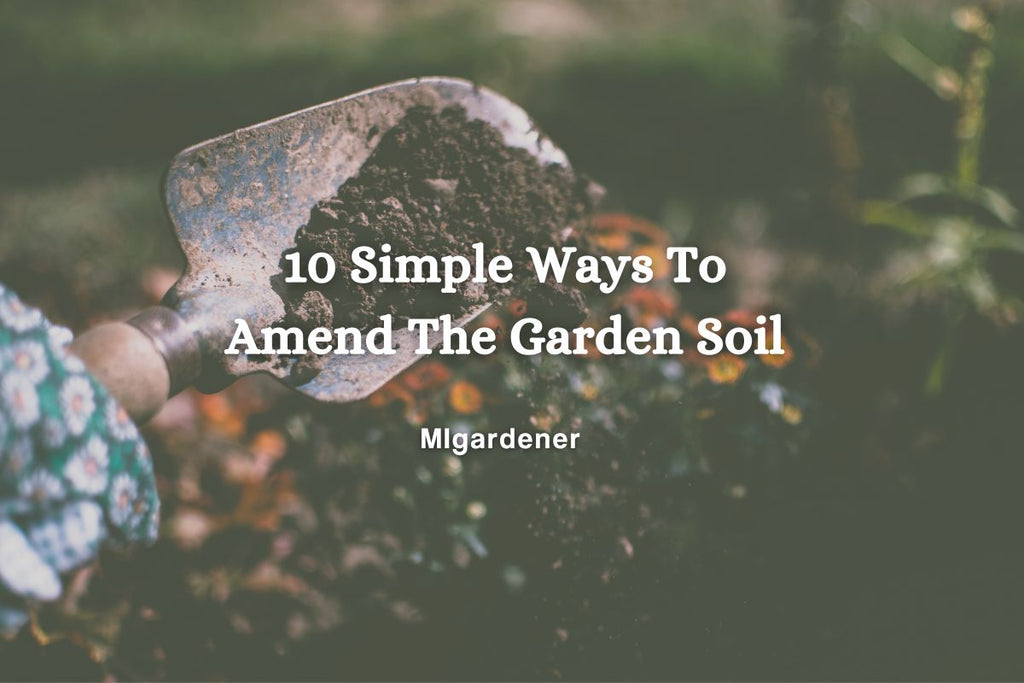
10 Simple Ways to Amend Soil
Amending your soil is important for several reasons:
Improving fertility: Soil that is low in essential nutrients, such as nitrogen, phosphorous, and potassium, can lead to poor plant growth. Amending your soil with organic matter and fertilizers can help to improve its fertility and promote healthy plant growth.
Enhancing water retention: Soil that is heavy in clay or lacks organic matter can have poor water retention. Amending your soil with organic matter can help to improve its water-holding capacity and reduce the need for frequent watering.
Improving soil structure: Soil that is compacted or heavy in clay can have poor structure, which can lead to poor drainage and root growth. Amending your soil with organic matter and gypsum can help to improve its structure and promote healthy plant growth.
Controlling pH: Soil that is too acidic or too alkaline can inhibit plant growth. Amending your soil with lime or sulfur can help to adjust the pH level and make it more conducive to healthy plant growth.
Reducing erosion: Soil that is bare or poorly protected can be subject to erosion. Amending your soil with cover crops and mulching can help to reduce erosion and protect your soil from the elements.
Here are 10 ways you can improve your soil quality simply and easily for a better garden.
Composting: Composting is a great way to improve the overall health and fertility of your soil. By adding compost to your soil, you are adding essential nutrients and microorganisms that will help to promote healthy plant growth. Compost adds humus which aids in water retention and adding organic material which will break down over time. This helps to add spaces for beneficial fungi to

Cover Cropping: Cover cropping is another great way to improve your soil. By planting a cover crop, such as clover or rye, you can add organic matter to your soil and help to control erosion.

Mulching: Mulching protects your soil from erosion and to keep it moist. By adding a layer of mulch to your soil, you can also help to add organic matter to your soil and promote healthy plant growth. Mulch can be shredded wood, pine needles, straw, leaves, and even semi-finished compost.

Liming: If your soil is too acidic, you may need to add lime to it. Lime is a natural soil amendment that can help to raise the pH level of your soil and make it more alkaline. PLEASE NOTE, a soil pH test should be done to ensure you are not adding too much. This needs to be done yearly as well. The good thing is though that very few soils are too acidic.
Gypsum: Gypsum is a natural soil amendment that can help to improve the structure of your soil. It can help to break up heavy clay soils and make them more porous, allowing water and air to penetrate more easily. Gypsum is great too because it does not affect soil pH.

Rock Phosphate: Rock phosphate is a natural soil amendment that can help to promote healthy plant growth. It is a great source of phosphorus, which is an essential nutrient for plants. It also helps to regulate soil biology. Many beneficial bacteria and fungi use phosphate to grow and multiply.
Greensand: Greensand is a natural soil amendment that is rich in iron, potassium, and other trace minerals. It is a pulverized roxk deposit and contains hundreds of beneficial micronutrients that will be like a multivitamin for your plants and soil. It can help to promote healthy plant growth and can be used to improve the structure of your soil.

Blood Meal: Blood meal is a natural soil amendment that is high in nitrogen. It can help to promote healthy plant growth and can be used to improve the fertility of your soil.
Double digging: Double digging or broad forking can help to loosen the soil, especially when using compost as an amendment. The breaking up of soil in a gentle way

Vermicompost: Vermicompost is one of the best ways to improve the fertility of your soil. Worms break down organic material in a natural way, increasing nutrients, but also loosening soil. Many gardeners will add composting worms right to their garden, while others will compost in their garage in worm bins and add just the worm castings to the garden. By adding vermicompost to your soil, you are adding essential nutrients and microorganisms that will help to promote healthy plant growth.

By using these methods, you can improve the health and fertility of your soil, which in turn will lead to healthier plants and a more bountiful garden. Remember that soil improvement is a gradual process and it may take a while to see the results of your efforts. Regardless of what you do, just remember you are making a difference!
Grow bigger,
Luke
Leave a comment